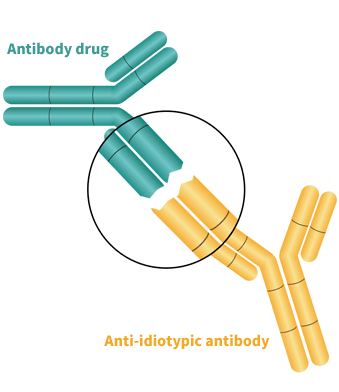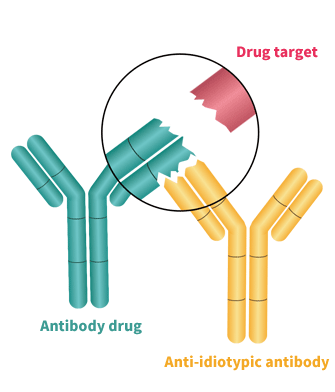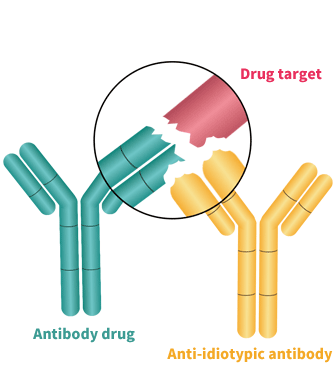 Limited Edition Golden Llama is here! Check out how you can get one.
Limited Edition Golden Llama is here! Check out how you can get one.  Limited Edition Golden Llama is here! Check out how you can get one.
Limited Edition Golden Llama is here! Check out how you can get one.
 Offering SPR-BLI Services - Proteins provided for free!
Offering SPR-BLI Services - Proteins provided for free! Get your ComboX free sample to test now!
Get your ComboX free sample to test now!
 Time Limited Offer: Welcome Gift for New Customers !
Time Limited Offer: Welcome Gift for New Customers !  Shipping Price Reduction for EU Regions
Shipping Price Reduction for EU Regions
Since the 1980s, therapeutic protein drugs (such as proteins, monoclonal antibodies, bispecific antibodies, antibody-drug conjugates, etc.) are extensively used in the treatment of tumor, HIV and other diseases. This has contributed in the development of the pharmaceutical industry and human health.
Pharmacokinetic and immunogenicity research run through the entire life cycle of drug development. More attention has been paid in the research of therapeutic protein drugs, which has become the consensus of the drug administration authorities and medical research. The establishment of non-clinical analysis and evaluation methods can provide early guidance for clinical research. It helps to improve the safety and efficacy of drugs. The FDA, NMPA and other regulatory agencies require that the drug's effectiveness and safety must be demonstrated in animals before it enters the clinic. Both preclinical and clinical studies need to study the PK of the drug. Meanwhile, the FDA recommends that the immunogenicity testing is best performed in the IND Phase and clinical phase I. Therefore, the establishment of a good PK/ADA assay is extremely important for the preclinical, clinical analysis and evaluation of drugs.
Pharmacokinetic (PK) principles integrate drug absorption, distribution, metabolism, and excretion in organisms. Moreover, changes in blood drug concentration over time can be explain with the help of mathematical principles and methods. The blood drug concentration-time curve, refers to the dynamic process of the blood drug concentration changing with time, reflecting the metabolism of the drug in the body. Since blood is the medium for the absorption, distribution, metabolism, excretion of drugs and their metabolites in the body. The drugs concentration in various body fluids and tissues maintains a certain proportional relationship with the drug concentration in the blood. So the change of drug concentration in blood is most important. It is the most used sample.

Fig 1. Blood drug concentration-time curve
In pharmacokinetic studies, anti-idiotypic antibodies can specifically identify the unique position of biological drugs and are indispensable detection reagents for PK research. They can be used to detect the content of antibody drugs in animal or human serum. PK research plays an important role in clinical safety, efficacy, analysis of drug interactions, guiding rational drug use, and improving drug dosage forms.
Immunogenicity can be defined as the ability of a drug and/or its metabolites to induce an immune response to itself or related proteins or immune-related events. Immunogenicity has a wide range of effects. Some unexpected immune reactions may lead to neutralize biological activity of drugs or cross immune reactions. This may lead to allergic reactions and cytokine release syndromes. From the perspective of clinical manifestations, the immunogenicity of the drug may not have a significant impact on patients, and it may also seriously affect the pharmacokinetics, pharmacodynamics, safety, and effectiveness of the drugs.
Table 1. Immunogenic clinical issues
| Clinical issues | Clinical results |
|---|---|
| Safety | Allergic reaction Autoimmune deficiency |
| Effectiveness | Increase or decrease drug efficacy Change the half-life Change the biological distribution |
| Pharmacokinetics (PK) | Change PK,PD |
| Other | Produce antibodies, but no corresponding effect |
Based on the effectiveness and safety hazards of the drugs immunogenicity, the evaluation and monitoring of immunogenicity is an indispensable research stage in the drug development process. Immunogenicity research mainly focuses on the detection and characterization of ADA.
Usually, anti-drug antibody is not a secondary antibody that recognizes the constant region of an antibody. An anti-antibody that is against a specific epitope group on the variable region of the antibody molecule called anti-idiotypic antibody.



Figure 2. Types of anti-idiotypic antibodies
All biological agents may induce a certain degree of ADA. These antibodies may be harmless, may reduce the efficacy and half-life of the drug, and even can be life-threatening.
Anti-idiotypic antibodies are widely used in drug development and an important reference for immunogenicity analysis. It can also specifically detect the level of antibody drugs in the body. It is an important reagent for pharmacokinetics (PK) research.
Table 2. Anti-idiotypic antibody application
| Application | ADA assay | PK assay |
|---|---|---|
| Antibody species | Rabbit | Mouse |
| Antibody type | Polyclonal antibody | Monoclonal antibody |
| Antibody action | Positive reference | Neutralizing antibody: free drug Non-neutralizing antibody: total drug |
| Sensitivity | 100 ng/mL | Related to dosage |
Table 3. Selective development of anti-idiotypic antibodies for different drugs
| PK assay | ADA assay | |
|---|---|---|
| Biosimilar drugs | For the variable region of the drug, development or the original ADA product | For the variable region of the drug, development or the original ADA product |
| Monoclonal antibody | Develop single or one pair anti-idiotypic antibody against the variable region of the drug | Develop a polyclonal antibody against the variable region of the drug |
| Bispecific antibody | Develop one pair anti-idiotypic antibody against the variable regions of the two parent antibodies | Develop a polyclonal antibody against the full-length antibody |
| Antibody-Drug Conjugate,ADC | Develop an anti-idiotypic antibody against the variable region of the drug and the small molecule respectively | Develop a polyclonal antibody against the entire ADC |
| Nanobody/SCFV | Develop single or one pair anti-idiotypic antibody against the variable region of the whole antibody | Develop a polyclonal antibody against the variable region of the whole antibody |
| CAR-T | For SCFV, Cell-Base Assay | For SCFV, Cell-Base Assay/ELISA |
ACROBiosystems provides anti-idiotypic antibody development service to help PK/ADA assay of macromolecular drugs
Focusing on protein technology, products, and services in the development of biological drugs, ACROBiosystems is committed to providing target antigens, other key reagents and related services required in the development of targeted therapeutic drugs. It can provide you with a series of high affinity, specificity, sensitivity anti-idiotypic antibody and PK plasma concentration quantitative detection kit. Meanwhile, to meet the diverse needs of customers, we can also provide one-stop services from antigen preparation to monoclonal anti-idiotype antibodies, polyclonal anti-idiotype antibodies, pharmacokinetics and immunogenicity testing kit development.
| Type | Anti-ID mouse monoclonal antibody | Anti-ID rabbit polyclonal antibody |
| Scope of application | PK assay | ADA assay |
| Preparation cycleM | 4-6 months | 10-14 weeks |
| Advantage | Single epitope Good specificity Good stability between batches | Can simulate the real situation in blood samples Relatively short preparation cycle Low cost |
| General detection method |  |  |
![]() Efficient
Efficient
Fast response, one-on-one service of the project team, real-time follow-up of the experiment progress
![]() Professional
Professional
Provide key reagents for PK/ADA analysis for a variety of drugs (monoclonal antibody, bispecific antibody, ADC, CAR-T)
![]() Multifunctional
Multifunctional
Provide one-stop service from antigen preparation to monoclonal anti-idiotype antibodies, polyclonal anti-idiotype antibodies, PK and immunogenicity test kit developments
![]() Reliable
Reliable
Ensure delivery of PK/ADA test kits with sensitivity that meets regulatory requirements
This web search service is supported by Google Inc.
